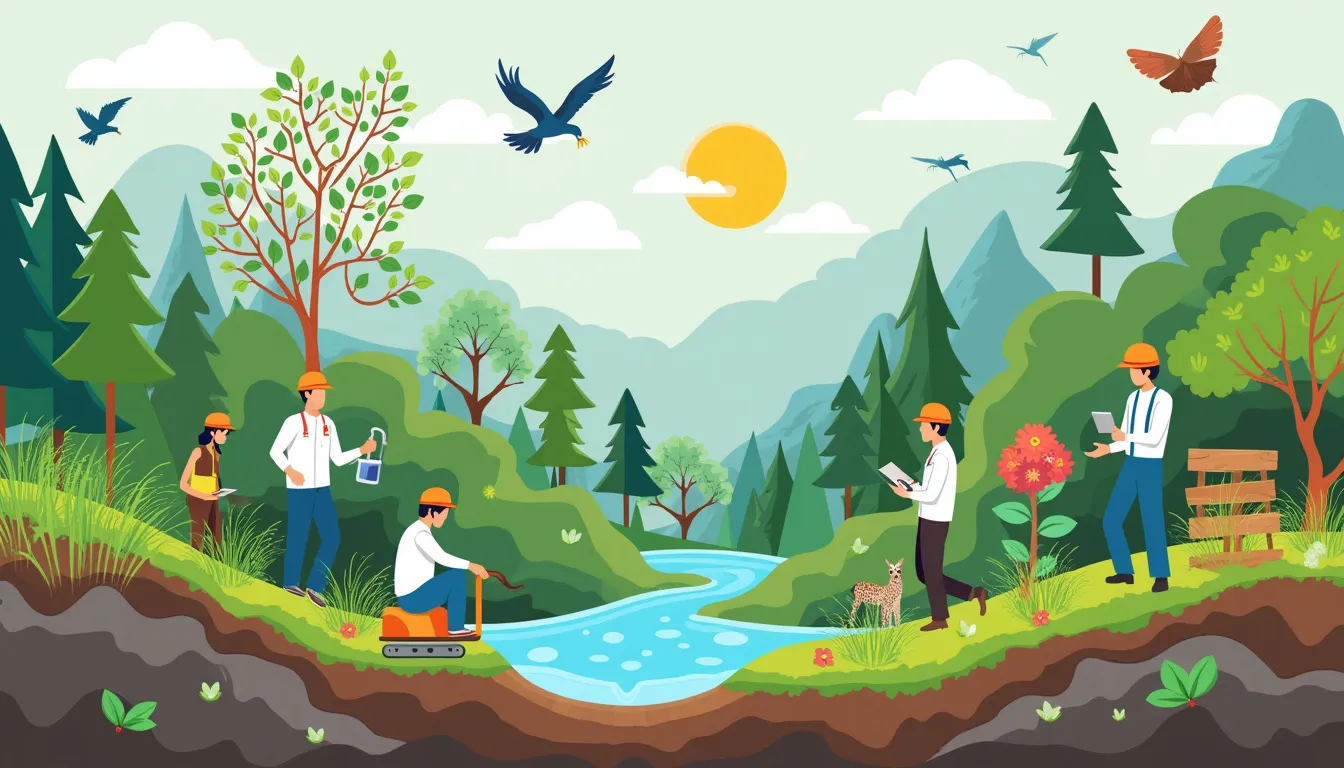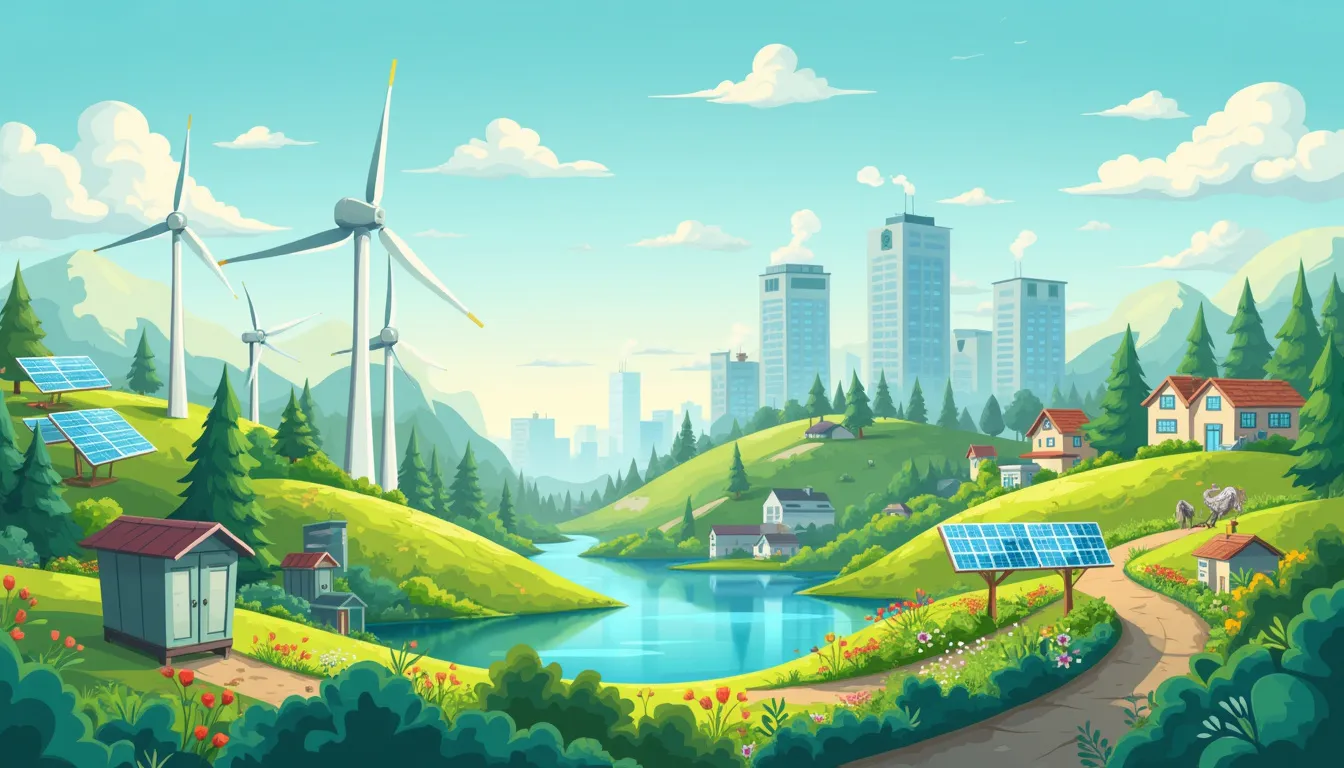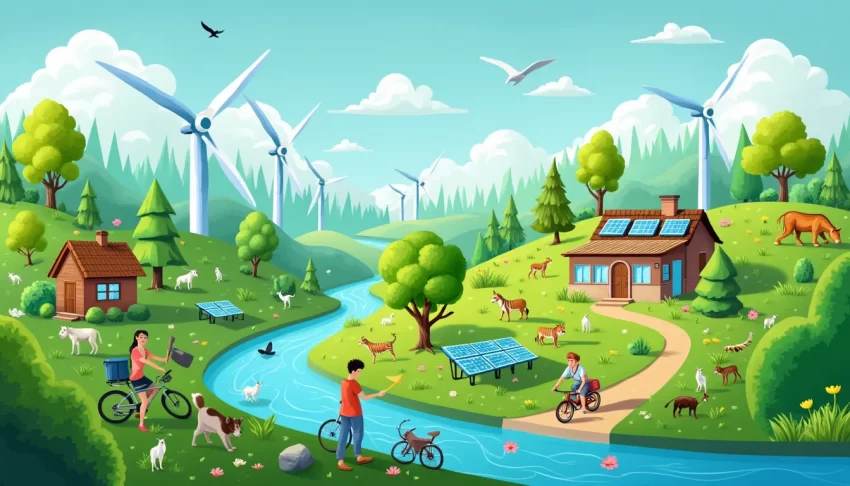In today’s rapidly changing world, the significance of environmental services cannot be overstated. As our planet faces unprecedented challenges such as climate change, biodiversity loss, and pollution, the need for essential environmental services has never been more urgent. These services form the backbone of a sustainable future, providing the necessary support to maintain the health and integrity of our ecosystems. They also play a crucial role in ensuring that future generations can enjoy the same natural resources and quality of life that we do today.
A sustainable future hinges on our ability to leverage and promote environmental services effectively. These services encompass a wide range of activities and practices that help manage natural resources, control pollution, and foster ecological balance. By understanding and enhancing these services, we can mitigate adverse environmental impacts and create more resilient communities. This not only protects our planet but also stimulates economic growth by fostering green jobs and promoting technological innovation.
The relevance of promoting environmental services extends beyond mere environmental conservation—it’s about creating a harmonious relationship between humans and nature. By integrating these services into our daily lives and business operations, we can contribute significantly to global sustainability efforts. Whether through better waste management practices, pollution control measures, or supporting biodiversity, every action counts. The journey towards a sustainable future is a collective responsibility, and the adoption of essential environmental services is a critical step in this direction. Let’s explore how these services can shape a more sustainable world and the concrete actions we can take to make a lasting impact.
Introduction to Essential Environmental Services
Environmental services play a vital role in our planet’s health and the longevity of human societies. These services encompass a broad range of activities and processes that support life, from carbon sequestration and waste decomposition to water purification and pollination. Often unseen and underappreciated, environmental services are the backbone of our natural ecosystems and have direct implications for our daily lives and the global economy.
Importance of Environmental Services
The importance of environmental services cannot be overstated. They are integral to sustaining life on Earth and ensuring that natural resources remain available for future generations. According to the World Bank, ecosystem services contribute trillions of dollars annually to the global economy by maintaining the basic life-support systems of the planet. For instance, the Amazon rainforest’s carbon storage alone is estimated to have a present value of around $8.2 billion annually, highlighting the immense financial value of preserving natural habitats.
Environmental services also play a crucial role in biodiversity. Ecosystems with rich biodiversity tend to be more stable and resilient, capable of withstanding and recovering from environmental stresses such as climate change or pollution. This diversity makes the natural world healthier and more productive, creating a cascade of benefits for us all. From the air we breathe to the water we drink, the essential services provided by the environment are fundamental.
Brief Overview of a Sustainable Future
A sustainable future hinges on the harmonious interplay between economic development, environmental stewardship, and social equity. This balance ensures that we meet our present needs without compromising the ability of future generations to meet theirs. Sustainable development requires an ongoing commitment to practices that reduce environmental footprints, conserve resources, and foster an equitable society.
The United Nations’ 2030 Agenda for Sustainable Development, which includes 17 Sustainable Development Goals (SDGs), underscores the urgency and necessity of fostering sustainability. These goals range from ensuring clean water and sanitation to promoting affordable and clean energy. All these depend on the effective provision and management of environmental services. The transition to sustainable practices also presents opportunities for innovation, growth, and the advancement of green technologies, which can improve our quality of life and stimulate economic progress.
Relevance of Promoting Environmental Services
Promoting environmental services is fundamental for achieving sustainability. Educational efforts and policy initiatives must highlight the intrinsic value of these services to encourage conservation and sustainable utilization. A 2020 study published in the journal Science revealed that protecting biodiversity might offer more benefits than previously recognized, making it even more imperative to advance public understanding and engagement around environmental services.
Supporting environmental services isn’t just a responsibility limited to governments and large organizations; individuals and small businesses also play a crucial part. Simple actions, like reducing waste, using water-saving technologies, and choosing sustainable options, can significantly aid in the conservation of these vital services. For instance, when businesses adopt sustainable practices like recycling and energy efficiency, they can reduce operational costs, improve their brand reputation, and contribute positively to the environment.
Moreover, promoting environmental services aligns with growing consumer awareness and demand for eco-friendly products and services. A Nielsen report found that 73% of global consumers are willing to change their consumption habits to reduce their environmental impact. This shift underscores a market-driven approach for businesses to harness sustainable practices as a competitive advantage.
To truly inspire and create a sustainable future, it’s essential that we all — from policymakers and corporations to individual consumers — understand and appreciate the critical services the environment provides. By engaging with and promoting environmental services, we can collectively foster a world where economic, social, and environmental dimensions are balanced for the benefit of all. Implementing robust environmental services is, therefore, a key step toward achieving the sustainability goals that are imperative for our planet’s future.

Major Categories of Environmental Services
Environmental services encompass a broad range of activities aimed at safeguarding our planet’s vital natural resources. They can be divided into two main categories: ecosystem services and environmental protection services. Understanding these categories helps us appreciate their scope and importance in maintaining ecological balance and promoting sustainability.
Definition and Scope of Environmental Services
Environmental services refer to the myriad of benefits that natural ecosystems provide to humans, as well as the efforts and processes aimed at protecting the environment. These services are crucial for maintaining the delicate balance of our ecosystems, which in turn support human life and economic activities. They encompass everything from the oxygen we breathe to waste management processes that keep our communities clean and safe. By recognizing and investing in environmental services, we contribute to building a more sustainable future.
Ecosystem Services: Provisioning, Regulating, Supporting, Cultural
Ecosystem services are the direct and indirect contributions of ecosystems to human well-being. They are often categorized into four main types:
- Provisioning Services: These are the tangible products we obtain from ecosystems, such as food, water, timber, and fiber. For instance, forests provide wood for construction and fuel, while freshwater ecosystems supply water for drinking, irrigation, and industrial processes. Agriculture, fisheries, and forestry are all reliant on these provisioning services.
- Regulating Services: These services help regulate natural processes, ensuring a stable environment. Examples include pollination of crops by bees, control of pests and diseases, water filtration, and climate regulation through carbon sequestration by forests and oceans. Wetlands, for example, can act as natural water filters, reducing the need for expensive man-made filtration systems.
- Supporting Services: Supporting services are the foundation upon which all other ecosystem services depend. They include nutrient cycling, soil formation, and primary production. Healthy soil, for example, provides essential nutrients required for plant growth, which in turn supports food production and carbon storage.
- Cultural Services: These services provide non-material benefits that enrich human life. They include recreational experiences such as hiking and fishing, spiritual enrichment, cognitive development, and aesthetic appreciation. National parks and protected areas, for instance, offer immense cultural value by preserving natural landscapes for future generations to enjoy.
Environmental Protection Services: Waste Management, Pollution Control
While ecosystem services are naturally occurring, environmental protection services involve human interventions designed to maintain and enhance the quality of our natural environment. Two critical components are waste management and pollution control:
- Waste Management: Effective waste management is vital for reducing the adverse impact of waste on the environment and public health. This includes the collection, transportation, processing, recycling, and disposal of various types of waste. For example, a community-driven recycling program can drastically cut down the amount of waste that ends up in landfills, reducing greenhouse gas emissions and conserving natural resources.
- Pollution Control: Pollution control involves measures to minimize the release of harmful substances into the environment. This can include air quality management, water treatment, soil decontamination, and noise reduction. For instance, the introduction of stricter emissions standards for industries and vehicles has led to a significant decrease in air pollution in many urban areas, improving the quality of life for residents and reducing health care costs associated with pollution-related illnesses.
By actively managing both ecosystem services and environmental protection services, we can achieve a more sustainable interaction with our environment. These efforts not only help preserve the natural world for future generations but also enhance the quality of life in the present.

Key Benefits of Environmental Services for Sustainability
Environmental services play a critical role in driving sustainability efforts. By integrating these services into our daily lives and business operations, we can greatly enhance the quality of our environment and ensure a healthier, more resilient future. Let’s delve into some of the essential benefits that environmental services provide for sustainability.
Enhancing Biodiversity and Ecological Balance
One of the most significant benefits of environmental services is the enhancement of biodiversity and the maintenance of ecological balance. Ecosystems are comprised of intricate webs of plant and animal life, all of which contribute to the overall health and stability of the environment. Services like habitat restoration, reforestation, and conservation programs are pivotal in ensuring that these ecosystems remain diverse and robust.
For instance, consider the reforestation projects in the Amazon Rainforest. These initiatives are not only crucial in combating deforestation but also in preserving the forest’s biodiversity. By planting native trees and rehabilitating degraded areas, these projects support a multitude of species that rely on the rainforest for survival. This biodiversity, in turn, helps regulate natural processes such as pollination, water purification, and climate regulation, which are essential for both local and global environmental health.
Mitigating Climate Change Impacts
Environmental services are also instrumental in mitigating the impacts of climate change. Through activities like carbon sequestration, renewable energy promotion, and sustainable land-use practices, we can significantly reduce greenhouse gas emissions and enhance the planet’s resilience to climate-related disasters.
Take, for example, the introduction of carbon capture and storage (CCS) technology. CCS involves capturing carbon dioxide emissions from industrial processes and storing them underground to prevent them from entering the atmosphere. This technology has the potential to reduce carbon emissions from factories, power plants, and even transportation sectors, contributing to our broader efforts to limit global warming to 1.5 degrees Celsius above pre-industrial levels.
Promoting Public Health and Well-being
The connection between environmental health and public health is profound. Clean air, safe water, and uncontaminated soil are fundamental determinants of human health. Environmental services focusing on pollution control, waste management, and sanitation play a pivotal role in reducing health risks and improving overall community well-being.
Consider the Flint water crisis in Michigan that gained worldwide attention. It underscored the critical need for effective environmental services in urban water management. Initiatives to upgrade water infrastructure, monitor water quality, and manage waste responsibly are essential to prevent such public health emergencies. By investing in these services, communities can ensure access to clean and safe water, reducing the prevalence of waterborne diseases and improving life expectancy.
Economic Advantages and Green Job Creation
It’s not just the environment and public health that benefit from robust environmental services; the economy does as well. The transition to a greener economy has the potential to generate substantial economic benefits and create a wealth of job opportunities. Areas like renewable energy, sustainable agriculture, and eco-tourism are burgeoning fields that thrive with the help of advanced environmental services.
For example, the renewable energy sector has seen a tremendous boom in recent years. Jobs in solar and wind energy are growing at an impressive rate, outperforming traditional fossil fuel industries in terms of employment opportunities. According to the International Renewable Energy Agency (IRENA), transitioning to renewable energy could create an estimated 42 million jobs by 2050. This shift not only strengthens the economy but also builds a more resilient workforce equipped with skills for a sustainable future.
Furthermore, eco-tourism is a vivid illustration of how environmental services can drive economic growth while promoting conservation. By creating protected natural areas and promoting ecological education, eco-tourism has the dual benefit of generating revenue and fostering environmental stewardship. Destinations like Costa Rica, which emphasize eco-friendly practices and conservation, have become prime examples of how tourism can be leveraged to promote sustainability while boosting local economies.
In essence, the adoption and enhancement of environmental services are cornerstones in our pursuit of sustainability. These services enrich biodiversity, combat the impacts of climate change, boost public health, and underpin economic growth through the creation of green jobs. By recognizing and amplifying these benefits, individuals and businesses alike can contribute to a more sustainable and prosperous world.

Implementing Effective Environmental Services for a Sustainable Future
Government Policies and Regulations
Governments play a pivotal role in the implementation of effective environmental services. By enacting policies and regulations, they establish the framework necessary for sustainable practices. For example, the Paris Agreement is a global pact aimed at combating climate change by limiting global warming to below 2 degrees Celsius. Nationally, the Clean Air Act in the United States sets air quality standards to reduce pollution. These regulations are not just about compliance; they inspire innovation and push industries to adopt greener technologies.
Governments can also introduce incentives such as tax breaks, grants, and subsidies to encourage businesses to invest in sustainable practices. For instance, the Renewable Energy Development Program in India offers various financial incentives for companies investing in solar and wind energy. Governments create a favorable environment for sustainability through such initiatives, making it easier for businesses to transition towards greener practices.
Role of Private Sector and Community Initiatives
While government actions set the stage, the private sector and communities are the performers who bring sustainability to life. Businesses are increasingly recognizing the importance of incorporating environmental services into their operations. Tech giant Apple, for instance, has committed to becoming carbon neutral across its entire supply chain by 2030. This commitment involves using recycled materials, improving energy efficiency, and investing in renewable energy.
Community initiatives also play a crucial role. Grassroots movements and local organizations often drive change from the bottom up, addressing environmental issues that might not be on the radar of larger entities. Take the example of the community-led waste management programs in Curitiba, Brazil. Here, residents have taken the initiative to sort waste at the source, making recycling more efficient and reducing landfill waste.
Innovative Technologies and Sustainable Practices
Innovation is at the heart of implementing effective environmental services. Emerging technologies offer new ways to address long-standing environmental challenges. For instance, blockchain technology is being explored for its potential to increase transparency in supply chains, enabling consumers and businesses to make more informed choices. IBM’s Food Trust blockchain, for example, is used by retailers like Walmart to trace the journey of food products, ensuring they meet sustainability criteria.
Sustainable practices such as circular economy principles also play a significant role. Unlike the traditional linear economy of ‘take-make-dispose,’ a circular economy aims to keep products, materials, and resources in use for as long as possible. Companies like Patagonia exemplify this by encouraging customers to repair their gear instead of buying new, thus reducing waste and conserving resources. Another exciting development is the rise of urban farming and vertical gardens, which can significantly reduce the carbon footprint associated with transporting food over long distances.
Case Studies and Success Stories
Understanding the impact of environmental services is best illustrated through real-world examples. One notable success story is Sweden, which has become a global leader in waste management. The country recycles nearly 99% of its household waste, with less than 1% going to landfill. This has been achieved through a combination of comprehensive recycling programs, public education campaigns, and innovative technologies like waste-to-energy plants that convert household waste into electricity and district heating.
Another inspiring case is found in the Great Green Wall initiative in Africa. This ambitious program aims to combat desertification by planting a mosaic of green, productive landscapes across the Sahel region. Through community involvement and international collaboration, the project has restored thousands of hectares of degraded land, provided food security, and created jobs. The Great Green Wall illustrates how large-scale environmental services can yield multifaceted benefits, improving both local livelihoods and global environmental health.
By exploring these varied avenues—government policies, private and community initiatives, innovative technologies, and real-world case studies—we can see a comprehensive, multi-pronged approach to implementing effective environmental services. This layered strategy is essential if we are to achieve a sustainable future, harnessing the power of regulation, innovation, and grassroots action to create lasting change.
As we forge ahead into a future increasingly shaped by the imperative of sustainability, recognizing and leveraging the vital role of environmental services becomes more crucial than ever. By understanding the comprehensive scope of these services—from the nourishment provided by ecosystem services to the essential protections offered by waste management and pollution control—we can appreciate how deeply intertwined our well-being is with the health of our environment.
Environmental services offer a multitude of benefits that extend beyond mere ecological preservation. They are instrumental in fostering biodiversity, maintaining ecological balance, and enhancing the resilience of our natural systems against climate change. By mitigating climate impacts, these services contribute significantly to public health by reducing air and water pollution and ensuring safer, cleaner environments for communities.
Moreover, the economic advantages are compelling. The burgeoning field of environmental services drives green job creation and sustainable business opportunities, contributing to a more robust and resilient economy. Embracing these services supports a transition towards business models and practices that are not only profitable but also environmentally responsible and socially beneficial.
To actualize a sustainable future, the implementation of effective environmental services must be a collective endeavor embraced by governments, the private sector, and communities alike. Progressive government policies and stringent regulations can set the stage, but the real change happens on the ground, fueled by innovative technologies and community-driven initiatives. Encouragingly, success stories from around the globe demonstrate the tangible benefits that can be achieved when these stakeholders collaborate towards common sustainability goals.
Incorporating environmental services into both business strategies and daily practices requires commitment and creativity. Start small if needed—whether it’s adopting energy-efficient appliances at home, supporting local waste management initiatives, or integrating sustainable practices into your business operations. Each step, no matter how minor it may seem, contributes to a larger, collective impact.
By valuing and investing in essential environmental services, we can build a sustainable future where economic vitality and environmental stewardship go hand-in-hand. This proactive approach not only safeguards the planet for future generations but also enhances the quality of life and fosters a thriving, sustainable global community. So let’s take these lessons to heart and turn our awareness into action—because every effort counts in the journey towards sustainability.
Support Us: Check out our recommended products on Amazon.

